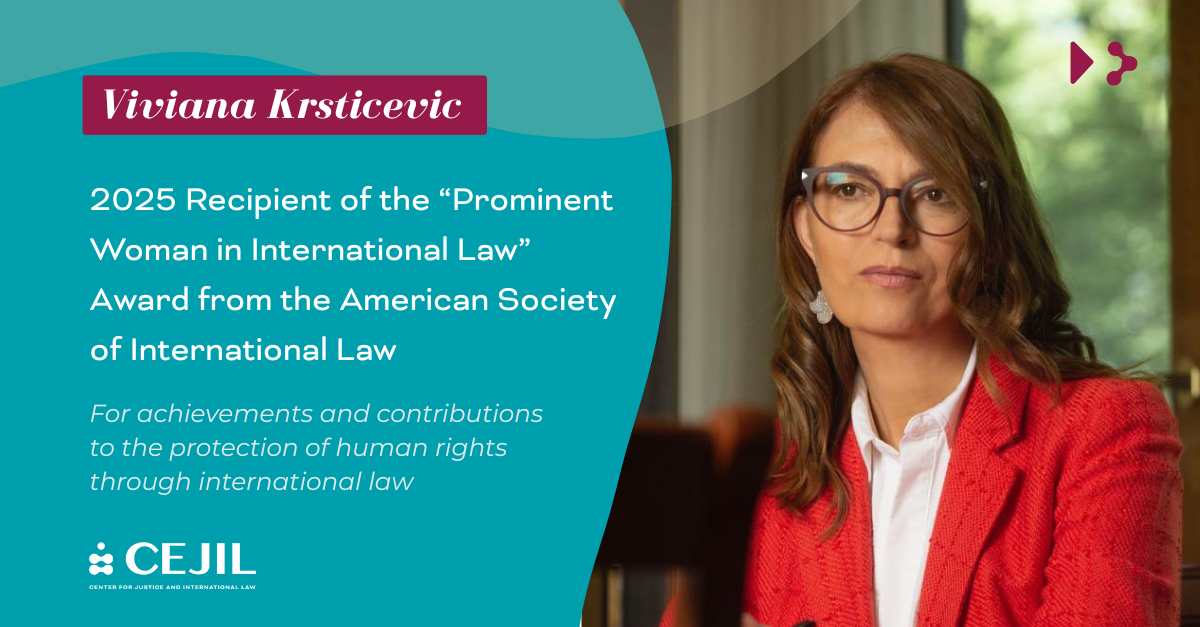






International Law and Human Rights in the Americas: The Perspective of Attorney, Viviana Krsticevic, 2025 Recipient of the “Prominent Woman in International Law” Award from the American Society of International Law
By Novella Benedetti for Unimondo
The “Prominent Woman in International Law” is a prestigious award conferred in the field of international law and human rights by the American Society of International Law. Established in 1993, over the years it has given visibility to professionals who often worked in delicate contexts. In 2022, for example, it was granted to Fatou Bensouda, former Prosecutor of the International Criminal Court, and in 2021 to Gabrielle Kirk McDonald, judge at the courts for the former Yugoslavia. The award ceremony this year will take place on Friday, April 18, with lawyer Viviana Krsticevic, executive director of the Center for Justice and International Law (CEJIL) as the protagonist.
What does receiving this award mean to you?
It is both an honor and a joy, as it represents not only recognition of my professional journey but also of the collective work carried out with many others to make international human rights law a more generous and effective space of protection.
Which cases have shaped your view of human rights in the Americas?
The most influential cases were those that marked the beginning of my career, particularly those related to crimes against humanity and enforced disappearances. For instance, the cases concerning amnesties in Peru were a powerful lesson on the transformative and mobilizing power of international law in the pursuit of truth and justice in the face of grave human rights violations. The impact of those cases—alongside others connected to social processes in Argentina, Bolivia, Guatemala, Colombia, Chile, Brazil, and many other countries—helped to affirm the right to the truth for families of victims of enforced disappearance. From those cases, I learned so much about the love, perseverance, and dignity that drive families to persevere, even when everything seems lost.
How do you assess the current human rights situation in the Americas?
We are going through a critical period. I am deeply concerned by the persistent physical, legal, and digital violence against human rights defenders, as well as the growing trend in several countries to shrink civic space and restrict freedom of association. Women and youth have been at the forefront of many struggles and have faced specific targeted forms of repression. Examples include my colleagues Berta Cáceres and Digna Ochoa, who were assassinated because of their work; and threats against individuals such as journalist Jineth Bedoya, young activist Francisco Vera, activist Vilma Núñez, and the Nicaraguan Center for Human Rights (CENIDH).
What do you see as the main challenges ahead?
Democracy in our region is being tested, with significant setbacks that have led to authoritarian regimes or the persistence of authoritarian practices in various countries. However, there is also a strong commitment from many sectors—civil society, the business community, and institutions—to ensure that the Americas remain a stronghold for democracy. Additionally, the climate emergency is affecting the individual and collective rights of millions across the region and stands as one of the defining issues of our time.
This award highlights and encourages women’s participation in international law. How has that space evolved?
There has been progress, with more visible leadership in decision-making spaces and a more relevant agenda for rights. Even in the past, women have been present in many areas of international law, particularly in the Inter-American system. They have been at the forefront of struggles, driving the development of conventions, and contributing to legal and institutional advancements. They have taken on many roles, as victims, attorneys, legal advisors, general counsels, and more.
What obstacles remain for women’s participation in international spaces?
Structural barriers still limit both the full enjoyment of rights and access to spaces of representation. Through the Gqual campaign, we have advocated concrete measures to ensure more inclusive and equitable representation, improve selection and voting processes, and enhance conditions for carrying out mandates. Over the past decade, we have seen substantial progress. One of the next important steps, we hope, will be to have a woman as Secretary-General of the United Nations.
International law is constantly evolving. Have there been any recent developments you consider especially relevant?
One of the most notable advancements in terms of women’s participation in decision-making spaces has been the adoption of General Recommendation 40 (GR40) by the Committee on the Elimination of Discrimination against Women (CEDAW). This document marks a paradigm shift by establishing 50:50 gender parity as the equality standard in collective spaces, applicable at all levels of decision-making, including international ones. Its implications are profound. Among the most exciting challenges, I would also highlight the evolution of international law and human rights in relation to climate change. The legal consequences and possible responses to this emergency require us to rethink fundamental aspects such as the scope of international responsibility and the rules for attributing such responsibility. It’s a profoundly creative and necessarily interdisciplinary exercise, with both local and global dimensions.
So, we are at a pivotal moment for human rights.
Indeed. The scale of the challenges we face today demands the building of networks and alliances that go beyond specific sectors. We need a deeper understanding of current problems and their impact. The fight for equality, for a peaceful, just, and sustainable world, is ultimately a fight for the world we want to live in.
Help us continue this critical and urgent work with a donation!
DONATE NOW